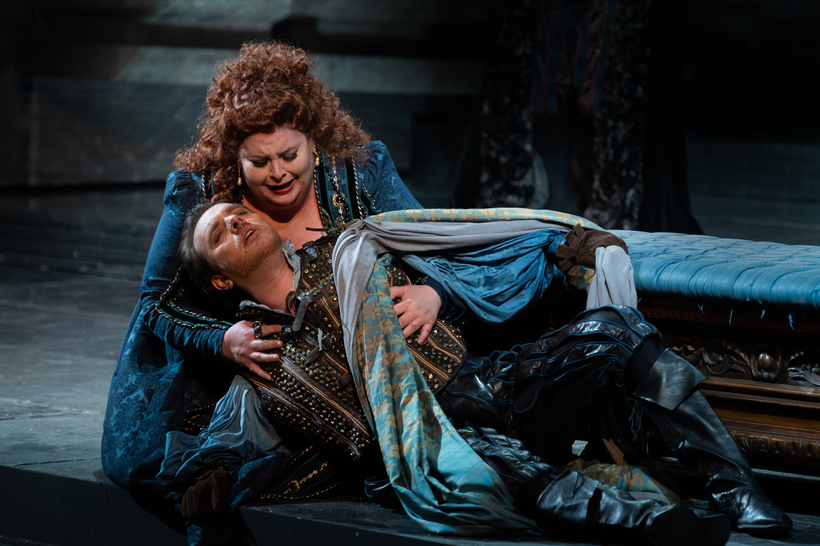Say, for the sake of argument, that you’ve had it up to here with name-brand directors who bury the operas you love under their whiz-bang concepts. Say, what’s more, that you hanker for the Golden Age voices of yesteryear. You console yourself with historic videos from archives no one could live long enough to exhaust. But the color and resolution of vintage material are mostly disappointing by contemporary standards, and you hate to settle.
Supposing all this is so, Verdi’s early melodrama Ernani, as filmed earlier this month at the Teatro dell ‘Opera di Roma, should be just the ticket. The Argentinean director and designer Hugo de Ana serves up a feast for the eye to recall the glory days of Luchino Visconti and Franco Zeffirelli, with a Renaissance profusion of blooms, plumes, and textiles so sensual you can practically touch it all. An otherwise enthusiastic Italian critic complained only that De Ana is short on “ideas.” Noted.

Based on a melodrama by Victor Hugo (whose Le Roi S’Amuse Verdi would soon adapt as Rigoletto), Ernani revolves around Elvira, a proud heiress of Aragon. Three gents—one in each major vocal category—are vying for her attention, sometimes all but colliding in private chambers with secret doors. The one Elvira likes—surprise!—is the tenor, a dispossessed aristocrat biding his time as the romantic outlaw Ernani. But her hand is promised to the bass, her uncle Don Ruy Gomez de Silva—that hateful geezer,” as she calls him, “who stalks me like a dirty ghost” (translation less free than you may think).
And then there’s the baritone, as so often in Verdi a figure of intriguing complexity. His avatar this time is Don Carlo, who finally resigns himself to the fact that Elvira is too high-born for him to trifle with yet too insignificant for him to marry. Yes; he’s in line to assume the mantle of Charlemagne as the Holy Roman Emperor.
Apart from the desire that drives them cross-eyed, the three rivals share a passion for honor. Caught in a double bind at the peak of the drama, Ernani declines Silva’s challenge to a duel only to hand him a bugle with the promise to end his own life at whatever time Silva chooses to blow it. The fateful motif of the bugle call, first sounded at the opening of the prelude, sets the tone for a score packed with arias and ensembles of thrilling eloquence. If you love Il Trovatore—and who doesn’t love Il Trovatore?—you owe it to yourself to get to know Ernani, the youthful masterpiece it eclipsed.
A hundred years ago, a new Ernani at the Metropolitan Opera starred Giovanni Martinelli in the title role, Rosa Ponselle as Elvira, Giuseppe Danise as Carlo, and José Mardones as Silva—voices connoisseurs still revere. Listed in the same order, the names in Rome match or better any to be assembled today; they are Francesco Meli, from Italy; Angela Meade, from the United States; Ludovic Tézier, from France; and Evgeny Stavisky, from Russia. Marco Armiliato conducts.
Ernani streams on the OperaVision Web site through January 29, 2023
Matthew Gurewitsch writes about opera and classical music for AIR MAIL. He lives in Hawaii

